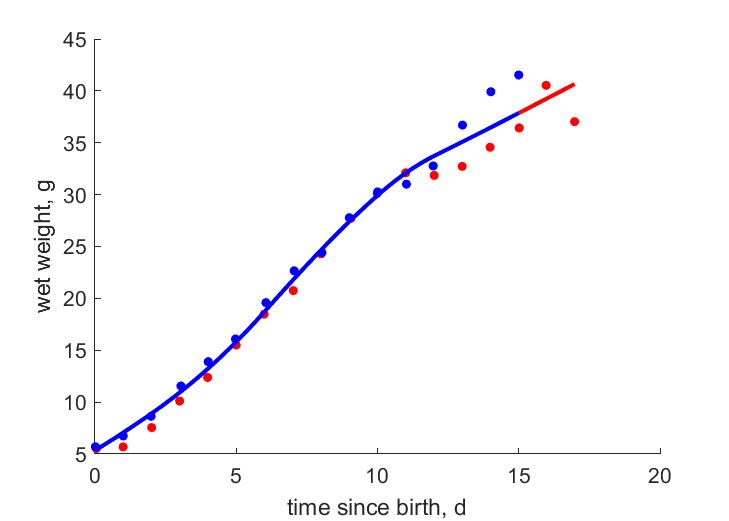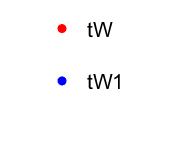Predictions & Data for this entry
| Model: std | climate: A, B, C | migrate: | phylum: |
| COMPLETE = 2.5 | ecozone: TPa | food: biCi | class: |
| MRE = 0.029 | habitat: 0iTh, 0iTf, 0iTi | gender: Dg | order: |
| SMSE = 0.002 | embryo: Tnpfm | reprod: O | family: |
Zero-variate data
| Data | Observed | Predicted | (RE) | Unit | Description | Reference |
|---|---|---|---|---|---|---|
| ab | 18 | 19.07 | (0.05943) | d | age at birth | Jack2002 |
| tx | 18 | 18.03 | (0.001744) | d | time since birth at fledging | Jack2002 |
| tp | 100 | 97.57 | (0.02427) | d | time since birth at puberty | guess |
| tR | 350 | 350 | ( 0) | d | time since birth at 1st brood | EoL |
| am | 4344 | 4362 | (0.004352) | d | life span | AnAge |
| Wwb | 5.5 | 5.319 | (0.033) | g | wet weight at birth | Jack2002 |
| Wwi | 54.5 | 56.21 | (0.03139) | g | ultimate wet weight | Jack2002 |
| Ri | 0.005479 | 0.005415 | (0.0118) | #/d | maximum reprod rate | Jack2002 |
Uni- and bivariate data
| Data | Figure | Independent variable | Dependent variable | (RE) | Reference |
|---|---|---|---|---|---|
| tW |   | time since birth | wet weight | (0.04566) | Jack2002 |
| tW1 |   | time since birth | wet weight | (0.04259) | Jack2002 |
Pseudo-data at Tref = 20°C
| Data | Generalised animal | Caprimulgus pectoralis | Unit | Description |
|---|---|---|---|---|
| v | 0.02 | 0.03634 | cm/d | energy conductance |
| p_M | 18 | 464.3 | J/d.cm^3 | vol-spec som maint |
| k_J | 0.002 | 0.01883 | 1/d | maturity maint rate coefficient |
| k | 0.3 | 0.2972 | - | maintenance ratio |
| kap | 0.8 | 0.9152 | - | allocation fraction to soma |
| kap_G | 0.8 | 0.7994 | - | growth efficiency |
| kap_R | 0.95 | 0.95 | - | reproduction efficiency |
Discussion
- Body temperature is guessed
- mod_1: v is reduced
- mod_2: Pseudo-data point k is used, rather than k_J; Data set tp and parameter t_R are added, the latter replacing clutch interval t_N. Postnatal T is based on PrinPres1991, see get_T_Aves. See further the revision page, theme puberty
Bibliography